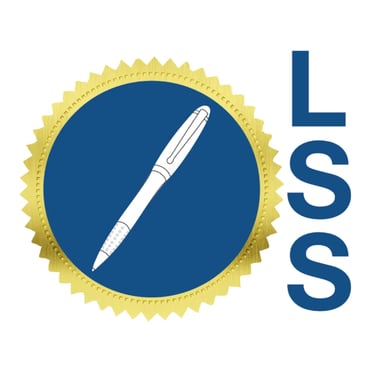Understanding Loan Closing Myths Explained
Discover the truth behind common loan closing myths. Clear up misunderstandings about loan closings and learn what to expect during the process. Get informed today!
LOAN SIGNING SERVICES
Frank L Coxx
5/22/20257 min read


The loan closing process, a pivotal moment in any real estate transaction, is often shrouded in mystery and misconception. For real estate professionals – from agents and brokers to lenders and investors – a clear understanding of the realities versus the myths is crucial. Misinformation can lead to unnecessary stress, delayed timelines, and even jeopardized deals. By distinguishing fact from fiction, professionals can better guide their clients, streamline operations, and foster confidence throughout the closing process.
Understanding Loan Closings
A loan closing, at its core, is the culmination of the home buying or refinancing process. It's the formal meeting where all parties involved sign the necessary documents to finalize the mortgage and transfer property ownership. This process involves numerous legal and financial considerations, making it imperative to approach it with informed awareness. Understanding each stage, from initial application to the final signatures, helps ensure a smooth and successful transaction.
What is a Loan Closing?
The loan closing is the official point at which the mortgage agreement is finalized and the borrower receives the funds for the property purchase. During the closing, all parties, including the buyer, seller (if applicable), lender representative, and potentially attorneys or escrow officers, convene to execute the required paperwork. This paperwork typically includes the mortgage note, deed of trust or mortgage, and various disclosures related to the loan terms and closing costs. The closing marks the official transfer of ownership from the seller to the buyer and the creation of a lien on the property in favor of the lender. A successful loan closing means the borrower has secured financing, the seller has received payment, and the real estate transaction is complete.
The Role of a Mobile Notary
In recent years, mobile notaries have become increasingly important in facilitating secure and efficient loan closings. A mobile notary is a commissioned notary public who travels to the borrower's location – whether it's their home, office, or another convenient place – to witness signatures on loan documents. This service offers unparalleled flexibility, particularly for borrowers with busy schedules or those who may have difficulty traveling to a traditional closing office.
Beyond convenience, mobile notaries play a vital role in ensuring the integrity of the signing process. They verify the identity of the signers, confirm their willingness to sign, and administer oaths or affirmations when required. This helps prevent fraud and ensures that the documents are legally binding. The use of a mobile notary contributes to a more streamlined and accessible closing experience. In the context of secure loan signings, the mobile notary's impartial witnessing and verification adds a layer of protection against potential disputes or legal challenges down the line.
Key Participants in the Process
A loan closing involves a diverse group of professionals working together to ensure a smooth transaction. Understanding the roles of each participant is crucial for navigating the process effectively.
Real Estate Attorney: In some states, a real estate attorney is required to oversee the closing process. Even when not mandated, an attorney can provide invaluable legal guidance, review documents, and protect the client's interests. They ensure compliance with all applicable laws and regulations.
Title Company: The title company plays a critical role in researching the property's ownership history to ensure it is free of liens, encumbrances, or other title defects. They also issue title insurance, which protects the lender and the buyer from potential financial losses due to title issues that may arise in the future. The title company also often acts as the escrow agent, holding funds and disbursing them according to the closing instructions.
Loan Officer: The loan officer is the borrower's primary point of contact with the lender. They guide the borrower through the loan application process, explain loan options, and provide updates on the loan's status. They also work closely with the underwriter to ensure that all necessary documentation is provided and that the loan meets the lender's requirements.
Escrow Officer: This individual (sometimes the same person as the title officer) is responsible for managing the funds involved in the transaction. They collect and disburse funds according to the terms of the purchase agreement and closing instructions, ensuring that all parties receive the correct payments.
Real Estate Agent: The real estate agent represents either the buyer or the seller in the transaction. They negotiate the terms of the purchase agreement, coordinate inspections and appraisals, and guide their clients through the closing process.
Common Loan Closing Myths
Despite the widespread availability of information, several myths persist about the loan closing process. These misconceptions can cause confusion, anxiety, and potentially lead to poor decisions. It's essential to address these myths with accurate information and evidence.
Myth 1: Loan Closings are Always Complicated
One of the most prevalent beliefs is that loan closings are inherently complicated and convoluted, filled with confusing jargon and endless paperwork. While it's true that the process involves numerous legal and financial documents, it doesn't necessarily have to be an overwhelming experience.
The perceived complexity often stems from a lack of understanding of the various steps involved and the purpose of each document. Many lenders and title companies are now implementing streamlined processes and utilizing technology to simplify the closing experience. Online portals, electronic signatures, and clear communication can significantly reduce the perceived complexity and make the process more manageable for all parties involved. Moreover, working with experienced professionals who can explain each step in plain language can alleviate much of the stress and confusion associated with loan closings.
Myth 2: Mobile Notaries are Not Reliable
Another common misconception is that mobile notaries are less reliable or less qualified than notaries who work in traditional office settings. This couldn't be further from the truth. Mobile notaries are held to the same legal standards and requirements as any other notary public. They undergo the same training, pass the same exams, and are commissioned by the same state authorities.
The key difference is that mobile notaries offer the added convenience of traveling to the borrower's location, making the closing process more accessible and flexible. Many mobile notaries have extensive experience in loan signings and are well-versed in the intricacies of mortgage documents. In fact, some specialize specifically in real estate transactions. Their expertise, combined with their commitment to providing convenient service, makes them a valuable asset in the loan closing process. For secure loan signings, mobile notaries often employ enhanced security measures to protect sensitive information and prevent fraud.
Myth 3: All Closing Costs are the Same Everywhere
A pervasive myth is that closing costs are standardized and uniform across different locations. In reality, closing costs can vary significantly depending on the state, county, and even the specific lender or service provider involved. Factors such as local taxes, recording fees, title insurance rates, and attorney fees can all contribute to these variations.
For instance, some states have higher property taxes than others, which directly impacts the amount of money due at closing. Similarly, title insurance rates may vary depending on the risk assessment conducted by the title company. Even the choice of lender can influence closing costs, as some lenders may charge higher origination fees or require specific services that others don't. Therefore, it's crucial for borrowers to obtain a detailed estimate of closing costs from their lender and to compare quotes from different service providers to ensure they are getting the best possible deal. The belief that closing costs are the same everywhere can lead to inaccurate budgeting and unexpected expenses, potentially jeopardizing the entire transaction.
Debunking the Myths with Facts
To effectively navigate the loan closing process, it's essential to replace common myths with accurate facts. Understanding the realities of the process empowers real estate professionals to make informed decisions and guide their clients with confidence.
Fact 1: Streamlined Processes Enhance Efficiency
Modern technologies and practices are significantly simplifying the loan closing process, enhancing efficiency and reducing the time it takes to complete a transaction. Online portals allow borrowers to securely upload documents, track the progress of their loan application, and communicate with their lender in real-time. Electronic signatures eliminate the need for physical paperwork, streamlining the signing process and expediting document delivery.
Automated underwriting systems use algorithms to assess risk and make loan approval decisions more quickly and accurately. These advancements not only save time but also reduce the potential for errors and delays. By embracing technology and adopting streamlined processes, lenders, title companies, and other service providers can create a more efficient and transparent closing experience for all parties involved.
Fact 2: Mobile Notaries Ensure Greater Flexibility
The benefits of using mobile notaries extend beyond mere convenience. Their flexible scheduling options can accommodate borrowers with busy lifestyles, ensuring that the closing process doesn't disrupt their work or personal commitments. Mobile notaries can meet borrowers at their homes, offices, or even hospitals or nursing homes, providing a level of accessibility that traditional notary services cannot match.
This flexibility is particularly valuable for individuals with mobility issues, those who live in remote areas, or those who simply prefer the comfort and privacy of their own surroundings. Furthermore, mobile notaries often offer evening and weekend appointments, making it easier for borrowers to find a time that works for them. By providing personalized service and adapting to the unique needs of each client, mobile notaries contribute to a more positive and stress-free closing experience.
Fact 3: Local Regulations Affect Closing Costs
Closing costs are not standardized across the board; instead, they are influenced by a variety of factors, including local laws and taxes. Understanding these local regulations is essential for accurately estimating closing costs and avoiding surprises at the closing table.
For example, some states have higher transfer taxes or recording fees than others. These taxes and fees are typically paid by the buyer or seller and can significantly impact the total closing costs. Similarly, the cost of title insurance can vary depending on the state and the specific title company involved. In some areas, it's customary for the buyer to pay for the title insurance policy, while in others, it's the seller's responsibility. Therefore, it's crucial to consult with local real estate professionals and review the closing disclosure carefully to understand all of the costs associated with the transaction.
Conclusion
In conclusion, distinguishing between loan closing myths and facts is crucial for navigating the real estate process effectively. By understanding the realities of loan closings, real estate professionals can better serve their clients, streamline their operations, and avoid costly mistakes. The myths surrounding the complexities of the process, the reliability of mobile notaries, and the uniformity of closing costs can all be dispelled with accurate information and a commitment to transparency. Relying on trusted professionals and staying informed about local regulations is paramount for ensuring smooth and successful real estate transactions. If you're looking for a reliable and experienced mobile notary and loan signing service in Charlotte, NC, and surrounding areas, don't hesitate to contact us at Integrity Closings CLT at fcoxx@integrityclosingsclt.com or 980-505-8050. We're here to help you navigate the loan closing process with confidence and ease.


